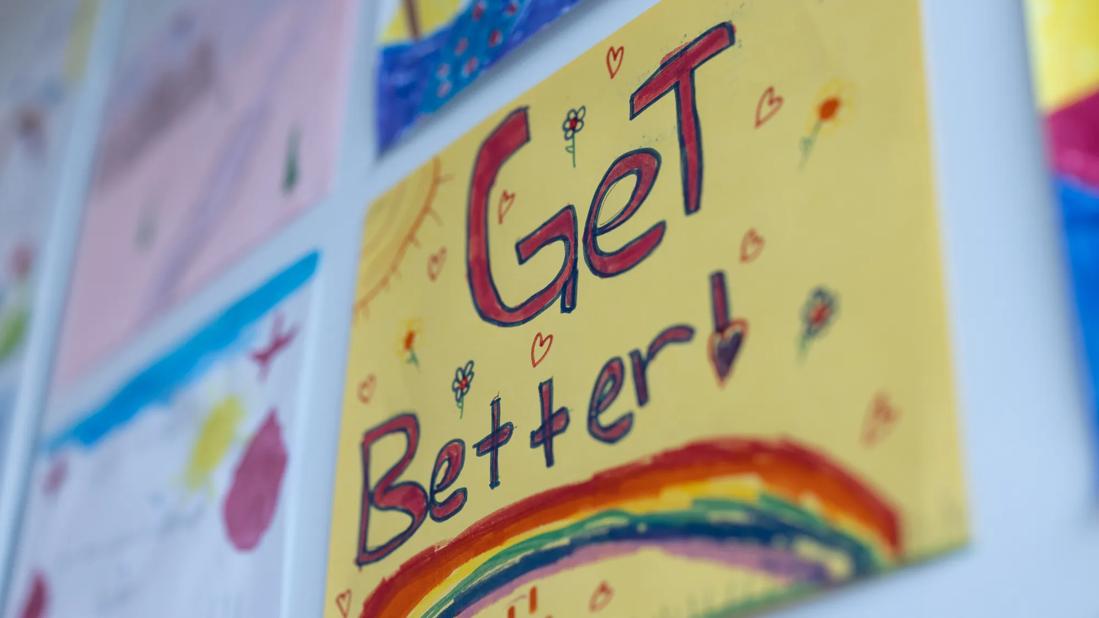Nurse-led research provides surprising insights

Image content: This image is available to view online.
View image online (https://assets.clevelandclinic.org/transform/4ee927fe-6a3b-4585-8f71-a96db74ef556/CCC_3874115_04-28-23_10695_AMO-jpg)
Get well card
Inspired by the events surrounding her own father’s hospitalization, Cleveland Clinic nurse researcher Amy Young, MSN, APRN, ACCNS-AG, CCRN, sought to examine the often-overlooked emotional and psychological burdens faced by family members visiting patients in a neurological step-down unit (NSDU).
Advertisement
Cleveland Clinic is a non-profit academic medical center. Advertising on our site helps support our mission. We do not endorse non-Cleveland Clinic products or services. Policy
Recalling the state of her father’s hospital room, which she found disorganized and chaotic, she explains that her unease sparked a curiosity about others’ experiences in the unit.
“I couldn’t help but wonder what other family members felt when spending time in these rooms,” she says.
Young’s contemplation raised essential questions about what clinicians could do to help families cope in a setting that may be both stressful and foreign to them. She says the choice to focus on the step-down unit rather than the intensive care unit (ICU) was strategic; the step-down environment typically accommodates more families and presents a slightly reduced level of anxiety compared with ICU settings.
The average length of stay in an NSDU is between three and four days, which provides nurses and other providers with a unique opportunity to engage with families, she notes.
“Family members are pulled out of their day-to-day routine and thrown into an environment that can be quite disorienting,” she says. “It’s important for caregivers to remember that families are managing their lives outside of the hospital while, at the same time, managing the stress of their loved one’s health status, which can change dramatically from one moment to the next.”
The central question posed to family members in Young’s study was: “What is it like to be a family member here?” Researchers adopted an open-ended approach that encouraged participants to share their thoughts freely. This methodology allowed for richer dialogue and more authentic insights into their experiences, says Young.
Advertisement
Young says a qualitative analysis of interview responses revealed four prominent themes: communication, caring, life-stress balance and the environment.
Family members expressed mixed feelings. While some appreciated the updates they received, many felt they were insufficient. Families said they desired ongoing, reciprocal communication characterized by openness and transparency. Simple updates such as “He’s doing well today” or “We had a tough night” were highly valued.
Young provides a poignant example shared by one respondent who highlighted perceived gaps in communication: “I thought [the patient] was having surgery today. I get up here, and it’s been moved to the next day.”
Such instances of miscommunication can contribute significantly to the stress experienced by families and underscore the need for consistent, reliable information from healthcare providers, Young says.
Young says her findings also emphasized the significance of caring. Families expressed gratitude for the compassion and attentiveness exhibited by the healthcare staff, indicating that emotional support can help influence their overall experience.
“Our results demonstrate how important it is for clinicians to engage with patients’ families in a way that acknowledges the role they play and the emotional investment they’re making in the care of their loved one,” she explains.
Participants also named life-stress balance as a major challenge, noting they struggled to balance work, personal responsibilities and social commitments with the demands of being present in the hospital. Finally, families reflected on their perceptions of the physical space (the patient’s hospital room) and its impact on their experience. An organized, welcoming environment was perceived as one that helped alleviate stress and provided solace, says Young.
Advertisement
“The research sheds light on an essential aspect of healthcare: the often-neglected perspectives of family members,” she says. “By recognizing family challenges and incorporating their feedback, healthcare professionals can enhance family support, ultimately leading to better outcomes for both patients and their loved ones. A greater understanding of family experiences not only enriches the care process but also fosters healing and connection, which are vital in the wake of neurological illnesses.”
Advertisement
Advertisement
Regional organizations collaborate to address nurse faculty shortage
How wellness habits help nurses flourish
Planning continues with critical, patient-focused input from nursing teams
Strengthening care through targeted resources and frontline voices
Embracing generational differences to create strong nursing teams
CRNA careers offer challenge and reward
An unexpected health scare provides a potent reminder of what patients need most from their caregivers
Cleveland Clinic Abu Dhabi initiative reduces ICU admissions and strengthens caregiver collaboration